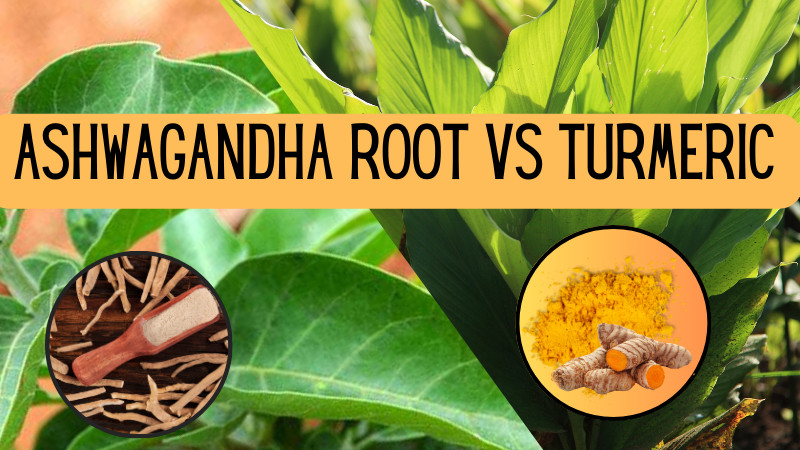The discussion around Ashwagandha Root vs Turmeric has been picking up steam lately. In the aisles of your local health food shop, you may hear chatter between people about their amazing capacities to improve gut health from the inside out.
Imagine this; these two are considered little fighters for your stomach. They go far beyond being ordinary plants. They are an offering from Nature with the ability to protect your gut health and fight off parasites.
However, this still leaves the question about the source of their power. What drives them, and how do they work their magic to improve your well-being?
Come with me as we explore and learn the mysteries behind these natural wonders together!
We’re going to leave no stone unturned as we uncover the truth behind ashwagandha root vs turmeric as we compare and contrast their health advantages. So, if you’re all about living your healthiest life and are curious about nature’s solutions to feeling better, stick around, take a sip of your favourite HerbiTea blend, and chill —you’re in for a treat!
Table of Contents
Ashwagandha Root vs Turmeric Overview
Ashwagandha
Ashwagandha belongs to a group of herbs known as adaptogens, which are used in the form of powders, teas tinctures, supplements, or in its raw state for their health advantages.
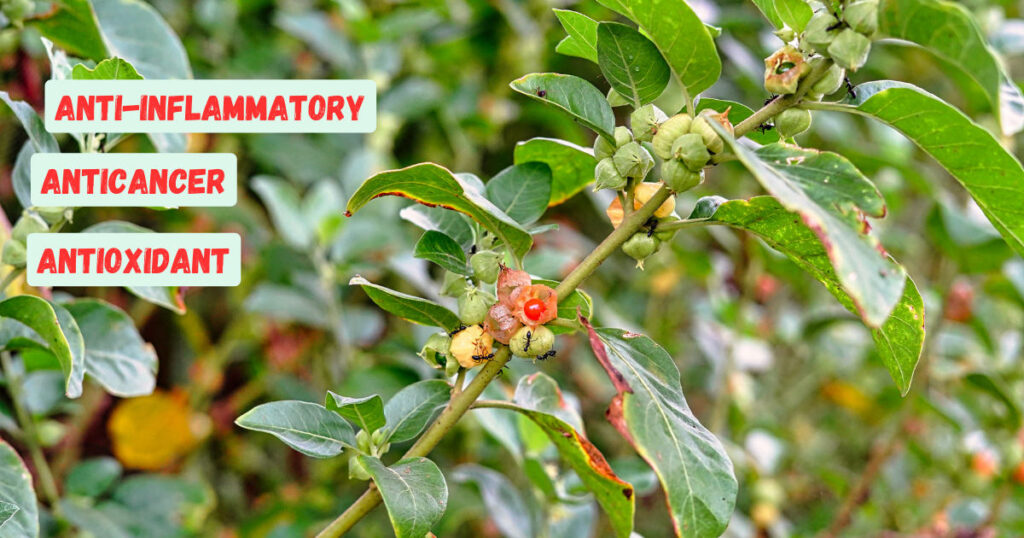
This a plant where many of its parts are put to good use. It is often referred to as Indian ginseng, winter cherry, or with its scientific name, Withania somnifera.
Its traditional and medicinal uses include promoting longer lifespans, reducing stress, and treating chronic illnesses. 1
Ashwagandha possesses anti-inflammatory, brain-protective, and stress-reducing properties. There is even research that suggests it may also be very effective at shielding your body from parasites. 2
Many people opt to use an alcohol-free Ashwagandha extract in liquid form.
Turmeric
Turmeric, a native plant in Southeast Asia, is used in traditional medicine and culinary spices.
Did you know that it was traditionally used for skin, respiratory, and digestive disorders in India? 3
You’ve no doubt heard about the benefits of turmeric chai, and that they are incredibly yummy. However, the story is not as simple as it seems.
Curcuma longa, or Turmeric, and its active ingredient curcumin are where the gold is hidden. Researchers have studied this offering from Nature and have found that it may have anti-inflammatory, anticancer, and antioxidant properties, along with other benefits.
Curcumin may help in the fight against parasites like hookworms and pinworms, according to recent studies. 4
Parasites like tapeworm, hookworm, liver fluke, and threadworm are one of the dangerous and toxic parasites that might harm our bodies. Curcumin acts by blocking the enzymes required for parasite survival and reproduction. They have a hard time surviving in the body as a result, and they eventually pass away. 5
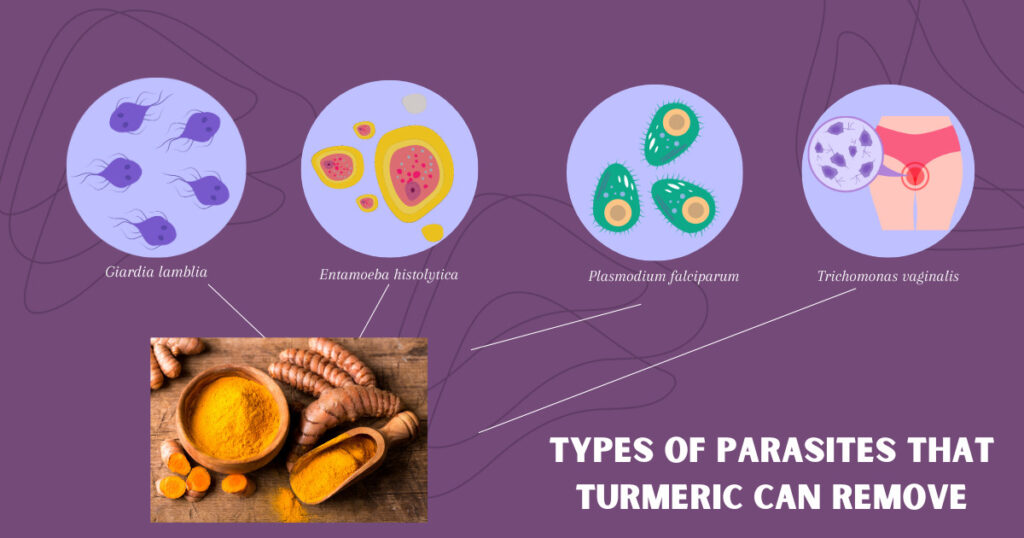
Based on a research review of the antiparasitic properties of curcumin, Turmeric can aid the development of parasitic worms in our bodies. Below are the types of parasites and how curcumin in turmeric can magnificently work in preventing them from entering our body:
- Giardia lamblia
- G. lambelia is a global parasite that infects 280 million individuals annually, with 200 million cases in Africa, Asia, and Latin America. Metronidazole and Nitazoxanide are effective treatments, but they have side effects like nausea and metallic taste. 6
- Curcumin has been shown to inhibit Giardia, destroying its cellular structure and causing deformation of the parasite membrane, flagella, and abdominal wall. Combining silver, chitosan, and curcumin nanoparticles effectively treated giardiasis, with nAg + Ncs + nCur resulting in a 91% reduction in parasites. New medications for treating Giardia infections are needed to address these side effects and complications for pregnant women.
- Entamoeba histolytica
- Entamoeba histolytica, an intestinal protozoan, causes amoebiasis, affecting 40-50 million people annually. A research study by I. Castañeda and team found that curcumin might be used to treat E. histolytica, making it an intriguing potential starting point for strong treatments that lessen the risk of amoebic liver abscess. 7
- Plasmodium falciparum
- Plasmodium falciparum, the deadliest Plasmodium species, causes malaria in humans through the bite of a female Anopheles mosquito, causing the most dangerous form of the disease. A study reveals that curcumin can treat malaria infection by taking it orally. 8
- Trichomonas vaginalis
- Researchers have discovered that curcumin, a substance found in turmeric, can effectively kill Trichomonas vaginalis, the parasite causing a common sexually transmitted disease, even when the parasite is resistant to usual treatments, suggesting curcumin as a potential new medication for this disease. 9
So, as we conclude, Curcumin has shown potential in treating parasites, making it a promising candidate for developing new antiparasitic drugs.
The Importance of Gut Health and Parasite Cleansing
A healthy gut is very important since your body’s entire health depends on it. It affects everything from digestion to immunity to emotions. There are even connections between
Looking after your gut also guarantees effective food absorption, which powers every biological process and acts as a first line of protection against pathogens.
A healthy gut also contributes to a happy mind. Researchers have found a solid connection between the gut and the mind and found that there are undeniable relationships between hormones and neurotransmitters. This is why Ultimate Fibre, which contains ashwagandha, is a key part of our routine.
Did you know that parasites can damage your body by feeding on it, growing, and multiplying?
Organisms, such as tapeworm, hookworm, liver fluke, threadworm, Ascaris, Trichinella, Giardia lamblia, and Entamoeba histolytica, rely on a host for survival and reproduction. Some of these can be really quite nasty little critters! 10
Then there are foodborne or waterborne parasites that may be present in food or water. The most common symptoms of exposure to these can include:
- Nausea
- Vomiting
- Stomach cramps, and
- Diarrhea
Dehydration and significant weight loss could result from a chronic infection. Some conditions could be asymptomatic. 11
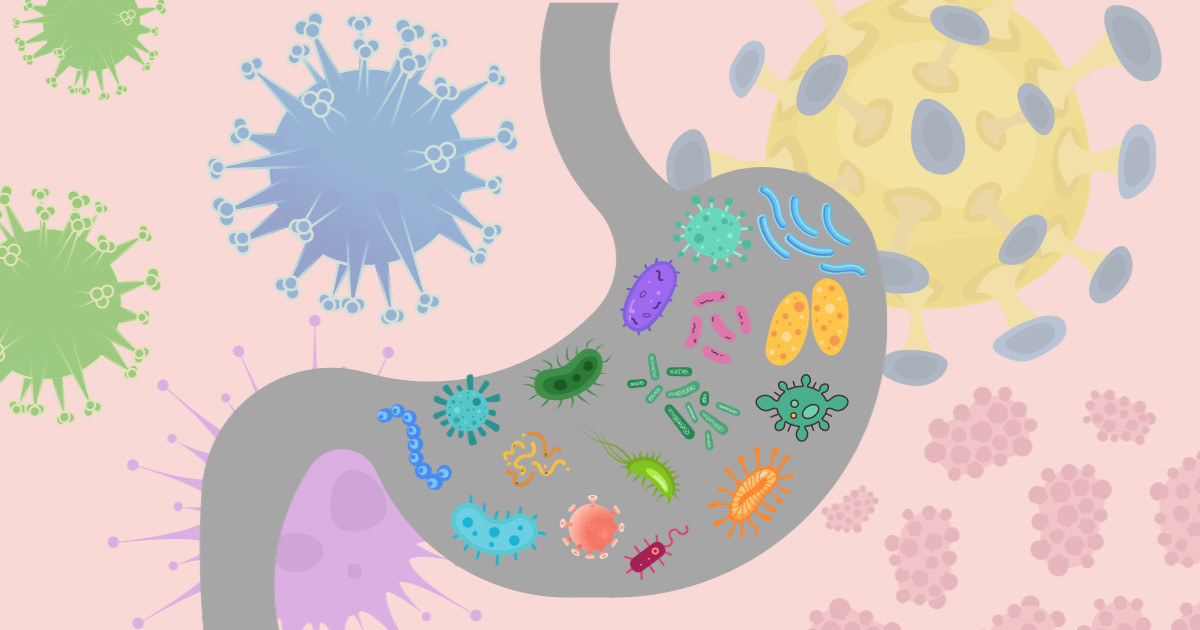
For those still a little confused about this, a dietary plan or herbal supplement regimen intended to cleanse the body of parasitic illnesses is commonly referred to as a parasite cleanse. Eliminating these freeloaders typically helps to restore your health, your energy levels are increased, and your gut health and immunity improved.
Ashwagandha Root vs Turmeric Benefits
Come with me as we discover the power of Ashwagandha and Turmeric; nature’s dynamic duo.
As they go head-to-head in cleansing your body, kicking pesky parasites to the curb, and renewing your natural glow, which will come out the champion in the microbiome royal rumble?

Ashwagandha Root Benefits
As an ancient offering packed full of potential, some of the ashwagandha benefits that have been studied include:
- Reducing gut inflammation
- Its strong adaptogenic qualities make the body more resilient to stress. Ashwagandha enhances cell-mediated immunity, which strengthens the body’s resistance to disease. Additionally, it has strong antioxidant qualities that aid in preventing cellular damage brought on by free radicals. 12
- Reducing signs of irritable bowel syndrome (IBS) or other gastrointestinal conditions
- Ashwagandha, a natural remedy for IBS, has been found to reduce IBS by regulating digestive enzyme production, healing gastric ulcers, and preventing diarrhea and constipation.
- Enhancing memory and thinking skills
- Ashwagandha has been demonstrated in several trials assessing its potential as a nootropic to improve any aspect of cognitive function, including focus, concentration, and memory. 13
- Managing stress and anxiety
- A clinical study by J. Salve and the team concluded that Ashwagandha extracts can be beneficial in managing anxiety and stress. 14
- Lowering the risk of cancer
- Several types of cancer cell lines were also susceptible to the anticancer effects of ashwagandha. A study shows that the water extract of ashwagandha leaves has anticancer activity due to the presence of Withanolides which contain anticancer properties. 15
You may be wondering, ‘How much ashwagandha should I use?’ Well, that’s a question to ask someone who can give you tailored advice to meet your personal needs.
The typical ashwagandha dosage depends on the condition being treated. But, it is important to note that standards based on clinical trials can be inconsistent and arguably unclear.
Some studies suggest 250-600 mg daily for stress reduction, while capsule dosages range from 250 to 1,500 mg. High doses can cause side effects, so consult a healthcare professional before use. 16
Turmeric Health Benefits
Curcuminoids are the main natural polyphenols found in the rhizome of Curcuma longa (turmeric) and other Curcuma species.
These compounds are responsible for the yellow colour of turmeric and have been traditionally used in Asian countries due to their antioxidant, anti-inflammatory, antimutagenic, antimicrobial, and anticancer properties. 17
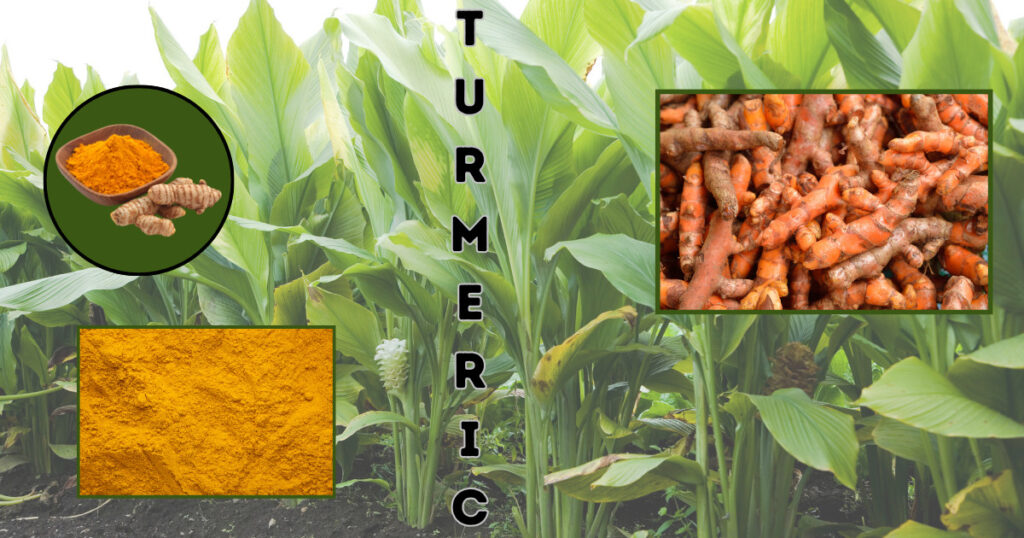
Curcuminoids target multiple signalling molecules while also demonstrating activity at the cellular level, which supports their multiple health benefits, including:
- Anti-inflammatory properties
- Curcumin may aid in the treatment of disorders like inflammatory bowel disease, pancreatitis, and arthritis because chronic inflammation is a factor in many chronic diseases. 18
- May ease Osteoarthritis related pain
- The curcumin in turmeric may offer potential benefits for those suffering from osteoarthritis. Its anti-inflammatory, antithrombotic, antioxidant, and antimicrobial properties have been shown in a six-week study where participants reported improvements in pain relief when given turmeric. 19
- Aid in the Prevention of Heart Disease
- Curcumin may also lessen your risk of developing heart disease and protect against age-related loss of function. 20
- May Prevent Cancer and Tumour from Growing
- According to some research, because curcumin is found in turmeric, it may potentially kill cancer cells and prevent tumour growth. 21
- Prevent Diabetes
- Curcumin’s anti-inflammatory and antioxidant properties may help treat and prevent diabetes, diabetic nephropathy, and related disorders like type 1 and 2 diabetes, by lowering and controlling blood sugar and managing diabetes. 22
Did you know that if you use turmeric along with black pepper, you may be able to get even more advantages out of the turmeric? And there are some very popular turmeric and ginger supplements available too!
Black pepper has a substance called piperine that aids in increasing the bioavailability of turmeric. The term “bioavailability” describes how much of a material is absorbed or used by the body. 23
Do you ever wonder how much turmeric to consume or what the best amount to take is? For you to get the anti-inflammatory effect, regular curcuminoid dosages of 500 mg/day can be a recommendable dose to promote gut health and immunity. 24
But remember, it’s very important to seek advice from your doctor when considering taking this.
Side Effects of Ashwagandha Root vs Turmeric
While these herbs can have health benefits, in some instances consuming too much of either of them may lead to unwanted reactions or side effects.
| Side Effects of Ashwagandha Root | Side Effects of Turmeric |
|---|---|
| Ashwagandha may pose a potential risk of miscarriage, similar to how using valerian root when pregnant can. 25 | Pregnant women should refrain from ingesting therapeutic doses of curcumin. There is a chance that taking significant amounts of curcumin while pregnant could cause early labour or miscarriage. 26 |
| Overuse of ashwagandha may lead to liver failure and liver injury. 27 | Turmeric might cause mild side effects such as stomach upset, nausea, dizziness, or diarrhea. 28 |
| Large doses of ashwagandha can lead to gastrointestinal issues such as diarrhea, nausea, and vomiting. 29 | The risk of kidney stone formation might be considerably increased by taking excessive amounts of turmeric. 30 |
| Ashwagandha use can result in drowsiness for some people. 31 | Turmeric may interact with medications such as blood thinners, antidepressants, antibiotics, antihistamines, cardiac medicines, and certain chemotherapy products. Additionally, it may cause certain diabetic drugs to not work as intended resulting in dangerously low blood sugar levels. |
These side effects above are just the common research and medical findings when using Ashwagandha Root and Turmeric. So remember, before using these you should consult your doctor to discuss your general health and any existing ailments you may have.
There are considerations to keep in mind, and often, the frequently asked questions we get around these two provide us with more perspectives to consider. Below are a few of the more relevant questions we wanted to share with you.
You may also wish to consider how turmeric and ginger stack up. Previously we ventured into the fennel seed vs ginger discussion, which is well worth taking a look at too.
FAQs
Can Ashwagandha and Turmeric taken together?
Absolutely. Ashwagandha and turmeric can be combined and consumed together. These two herbs complement each other’s health benefits, potentially enhancing each other’s effects on reducing inflammation, combating stress, and supporting the immune system. However, for your safety, consult your doctor when starting to take them.
Who shouldn’t take Ashwagandha and why?
Pregnant and breastfeeding women are advised not to take ashwagandha for the safety of the baby. Individuals with autoimmune diseases, such as rheumatoid arthritis, lupus, and Hashimoto’s thyroiditis, might want to avoid it since Ashwagandha could cause the immune system to become more active.
What happens to your body when you take Turmeric?
When you take turmeric, numerous positive reactions occur in your body. Curcumin, the primary component of turmeric, contains potent antioxidant and anti-inflammatory qualities.
This means it can help fight inflammation in your body, reduce pain related to arthritis, and protect against oxidative stress. Turmeric also supports brain health, improves digestion, and enhances the body’s ability to ward off various diseases due to its immune-boosting properties.
What organ does Turmeric affect?
Although turmeric is generally a healthy spice, taking too much of it may have negative effects, such as the development of kidney stones and liver.
How much Turmeric per day is safe?
Turmeric is generally considered safe when consumed in the amounts commonly found in food. However, when taking Turmeric supplements, adults can safely consume up to 8 grams or 500–2,000 milligrams of Turmeric per day without experiencing significant side effects.
Conclusion
It’s become evident as we’ve explored the powerful advantages of ashwagandha root vs turmeric that these natural powerhouses are allies in promoting gut health. Their amazing healing abilities open the door to wellness by internally balancing our bodies.
Now, we’d like to know what you think! Join the ashwagandha root vs turmeric discussion on our Instagram and Pinterest, share your stories, and let’s explore the world of holistic health and vitality more thoroughly together!
References
- “Ashwagandha” – G. Engels, J. Brinckmann, Last checked 17 October 2023 [American Botanical Council] [Archive] ↩︎
- “Health Benefits of Ashwagandha” – WebMD Editorial Contributors, Last checked 17 October 2023 [WebMD] [Archive] ↩︎
- “Turmeric” – NIH Staff, Last checked 17 October 2023 [National Center for Complementary and Integrative Health] [Archive] ↩︎
- “Antiparasitic properties of curcumin: A review” – K. Cheraghipour, A. Marzban, B. Ezatpour, S. Khanizadeh, K. Koshki, 25 December 2018 [AIMSS Press] [Archive] ↩︎
- “How Do You Get Rid of Tapeworms Naturally?” – P. Sachdey, Last checked 17 October 2023 [Medicine Net] [Archive] ↩︎
- “Giardiasis Medication” – H. Nazer, 30 January 2023 [Medscape] [Archive] ↩︎
- “Curcumin Attenuates the Pathogenicity of Entamoeba histolytica by Regulating the Expression of Virulence Factors in an Ex-Vivo Model Infection” – I. Castañeda, P. Rosales, N. Delgado, J. Hernandez, S. Pozos, A. Rangel, A. Romero, 15 August 2019 [PubMed Central] [Archive] ↩︎
- “Curcumin for malaria therapy” – R. Reddy, P. Vatsala, V. Keshamouni, G. Padmanaban, P. Rangarajan, 14 January 2005 [PubMed] [Archive] ↩︎
- “In vitro efficacy of curcumin on Trichomonas vaginalis” – B. Wachter, M. Syrowatka, A. Obwaller, J. Walochnik, 12 March 2014 [Springer Nature] [Archive] ↩︎
- “Intestinal worms in humans and their symptoms” – J. Johnson, 5 January 2023 [Medical News Today] [Archive] ↩︎
- “Parasites and Foodborne Illness” – FSIS Staff, 1 September 2017 [Food Safety and Inspection Service] [Archive] ↩︎
- “An Overview on Ashwagandha: A Rasayana (Rejuvenator) of Ayurveda” – N. Singh, M. Bhalla, P. de Jager, M. Gilca, 3 July 2011 [PubMed Central] [Archive] ↩︎
- “Efficacy and Safety of Ashwagandha Root Extract on Cognitive Functions in Healthy, Stressed Adults: A Randomized, Double-Blind, Placebo-Controlled Study” – K. Gopukumar, S. Thanawala, V. Somepalli, T. Rao, V. Thamatam, S. Chauhan, 30 November 20021 [PubMed Central] [Archive] ↩︎
- “Adaptogenic and Anxiolytic Effects of Ashwagandha Root Extract in Healthy Adults: A Double-blind, Randomized, Placebo-controlled Clinical Study” – J. Salve, S. Pate, K. Debnath, D. Langade, 25 December 2019 [PubMed] [Archive] ↩︎
- “Water Extract of Ashwagandha Leaves Has Anticancer Activity: Identification of an Active Component and Its Mechanism of Action” – R. Wadhwa, R. Singh, R. Gao, N. Shah, N. Widodo, T. Nakamoto, Y. Ishida, K. Terao, S. Kaul, 10 October 2013 [PubMed Central] [Archive] ↩︎
- “Adaptogenic and Anxiolytic Effects of Ashwagandha Root Extract in Healthy Adults: A Double-blind, Randomized, Placebo-controlled Clinical Study” – J. Salve, S. Pate, K. Debnath, D. Langade, 25 December 2019 [PubMed Central] [Archive] ↩︎
- “Curcumin: A Review of Its’ Effects on Human Health” – S. Hewlings, D. Kalman, 22 October 2017 [PubMed Central] [Archive] ↩︎
- “Anti-Inflammatory Effects of Curcumin in the Inflammatory Diseases: Status, Limitations and Countermeasures” – Y. Peng, M. Ao, B. Dong, Y. Jiang, L. Yu, Z. Chen, C. Hu, R. Xu, 2 November 2021 [PubMed Central] [Archive] ↩︎
- “Turmeric for Osteoarthritis” – L. Zoppi, 29 December 2022 [News Medical Life Sciences] [Archive] ↩︎
- “12 Scientific Health Benefits of Turmeric and Curcumin” – L. Bedosky, 4 June 2023 [Everyday Health] [Archive] ↩︎
- “Clinical effects of curcumin in enhancing cancer therapy: A systematic review” – K. Mansouri, S. Rasoulpoor, A. Daneshkhah, S. Abolfathi, N. Salari, M. Mohammadi, S. Rasoulpoor, S. Shabani, 24 August 2020 [PubMed Central] [Archive] ↩︎
- “Curcumin and Diabetes: A Systematic Review” – D. Zhang, M. Fu, S. Gao, J. Liu, 24 November 2013 [PubMed Central] [Archive] ↩︎
- “Why Turmeric and Black Pepper Is a Powerful Combination” – A. Goodson, 4 July 2018 [Healthline] [Archive] ↩︎
- “Turmeric” – Drugs.com Staff, 21 November 2022 [Drugs.com] [Archive] ↩︎
- “Ashwagandha” – NIH Staff, Last checked 17 October 2023 [National Center for Complementary and Integrative Health] [Archive] ↩︎
- “Is turmeric safe during pregnancy?” – J. Leonard, 28 February 2020 [Medical News Today] [Archive] ↩︎
- “Liver Dangers of Herbal Products: A Case Report of Ashwagandha-Induced Liver Injury” – M. Lubarska, P. Halasinski, S. Hryhorowicz, D. Mahadea, L. Szuber, P. Eder, A. Dobrowolska, I. Kazmierczak, 22 February 2023 [PubMed Central] [Archive] ↩︎
- “Turmeric – Uses, Side Effects, and More” – WebMD Staff, Last checked 17 October 2023 [WebMD] [Archive] ↩︎
- “Ashwagandha” – L. McWhorter, Last checked 17 October 2023 [MSD Manual] [Archive] ↩︎
- “A Spicy Dilemma: When Is Turmeric Bad For Your Kidneys?” – HealthMatch Staff, Last checked 17 October 2023 [HealthMatch] [Archive] ↩︎
- “Anticoagulant activities of curcumin and its derivative” – D. Kim, S. Ku, J. Bae, Last checked 17 October 2023 [PubMed] [Archive] ↩︎
Last Updated on 5 months by D&C Editorial Team
